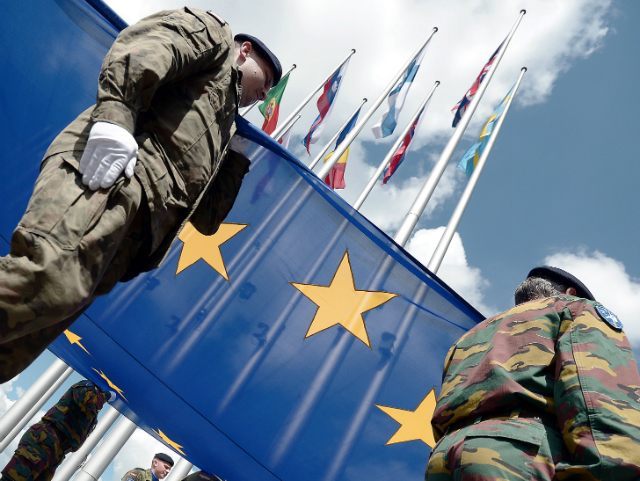Following EU President Jean-Claude Juncker’s call for an EU army, the European Parliament voted to implement the Common Security and Defence Policy last week.
As Get Britain Out reported back in March, this confirms the worst fears of deeper integration with Europe, in which only one British MEP voted directly for the resolution.
Like the former French President Charles de Gaulle, who declared a non-NATO France had ‘no friends but only interests’, EU federalists are ignoring the realities of collective security and are embarking on their own fantasies.
When the seeds of the EU were being planted, fierce envy would spur De Gaulle’s decision to withdraw from NATO in 1966, symbolising the rifts within the transatlantic alliance. This was because intense nationalism and anti-Americanism asserted France had been made was a pawn, subject to US interest.
Is it still wise for Washington to view the European Common Security and Defence Policy (CSDP) as a boost to NATO’s European ‘pillar’? Get Britain Out argues that in spite of structural reforms, the ideological stance of the European Commission is increasingly viewing the EU as a counterweight, rather than a compliment to NATO.
The federalists in the EU all know the CSDP requires the consent of all 28 Member States, so why are they pushing to create an integrated EU armed force right now, rather than prioritising cooperation through NATO? Could it be ideological?
As Juncker said himself: “A bunch of chickens looks like a combat formation compared to the foreign and security policy of the European Union”. Well, however true this may be, there are clear reasons behind it.
Unfortunately, most examples European capability tends to be scarce. Beginning with the crisis in the Balkans during the 1990’s, the lack of military capability and political will culminated with NATO taking the lead, or more specifically: US leadership.
Not surprisingly, the inefficiencies of the EU are not absent from its military actions either. A 2005 mission in the Sudan resulted in an uncoordinated “dual mission” alongside NATO, beset with resource duplication and logistical failures.
To avoid such calamities, the Europhiles should recognise the overlap between the security of NATO and the EU. 25 out of the 28 EU Member States are part of the transatlantic alliance, and most EU members assert their efforts to boost defence capabilities should complement — not compete with — those of the NATO alliance.
As French Defence Minister Alaine Richards highlighted, “No European country would have agreed to join in the construction of a European defence if it was to lead to a loosening of the transatlantic link”, however such common sense seldom prevails.
No one is suggesting European powers should continue to ‘bandwagon’ off US power, but it is a shame European leaders seek to compete with the US, rather than cooperate through NATO. It remains an issue because federalists consistently fall into a false zero-sum game between Atlanticism and Europeanism.
The failure of many European NATO members to reach the “magic 2 percent threshold” in defence spending is frequently followed by negative forecasts by defence analysts. In this context, European defence is deemed vital to the security of NATO.
NATO has not created obstacles for European self-interest, but has in fact created more opportunity. This is severely damaged by the EU Commission agenda, pursuing their goal of a unified European army.
The transatlantic alliance lies on very shaky foundations, and it is no coincidence the current crop of EU leaders have no generational memories of the Cold War and the importance of NATO.
The issue within the West is not between an ‘Atlantic or European’ identity, but instead it is between the actual level of commitment from NATO Member States who are seriously investing in defence. This can help explain the questionable commitment of Britain and Germany to the CSPD. Both countries have not viewed the NATO alliance as a mechanism for American dominance, compared to the more paranoid French.
While the development of a European strategy still has potential in the form of soft power and civil operations, the pragmatism of modern leaders has largely discredited the notion the EU is a realistic counterweight to NATO. This is clearly reflected in budgetary investment, which is far exceeded in NATO compared to the CSDP. The ambitions of a federalist ideology appear to surface within political rhetoric rather than realistic policy.
As the US ‘pivots towards Asia’, EU Commissioners could genuinely contribute and benefit from the transatlantic alliance, and not put forward its own ideological proposals after every crisis.
Only the most fanatic federalist believes the myth of EU sanctioned peace on the continent, ignoring the historic role of NATO for decades. The myth Germany and France would go to war if they could not impose austerity on Southern Europe shows we are in a truly bizarre state of affairs.
Recognising the jump from a free trade deal to a political superstate with a standing army shows how far the project has come. It is no wonder the public have rejected the federalist vision of ‘ever closer union’ and why the vote last week represents the latest step of gradual integration. The only way to avoid this is to Get Britain Out.
Chris Muspratt is a researcher for the cross-party Eurosceptic campaign group Get Britain Out

COMMENTS
Please let us know if you're having issues with commenting.